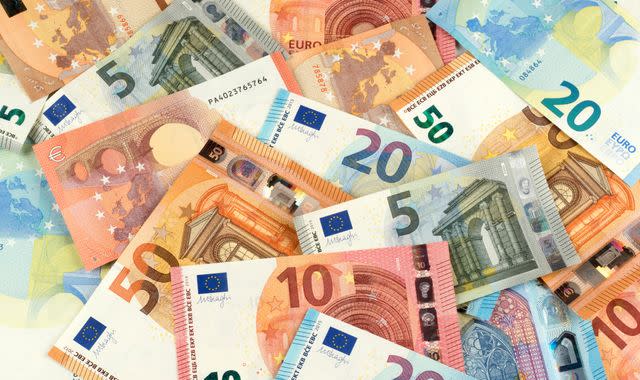Interest rate cut for euro area but no commitment to more

The 20 countries using the euro currency have seen interest rates cut from record highs following progress in the battle against inflation over the past two-and-a-half years.
The Frankfurt-based European Central Bank (ECB) said on Thursday it was "appropriate" to trim its main deposit rate from 4% to 3.75%.
It followed an assertion last month by its president, Christine Lagarde, that the pace of price increases was now "under control".
But the Bank declared in a statement that the battle was not won - signalling data-driven caution on future policy decisions in the months ahead.
Its staff even revised upwards their forecasts for inflation this year and next.
"The governing council will continue to follow a data-dependent and meeting-by-meeting approach to determining the appropriate level and duration of restriction," the ECB said, adding: "The governing council is not pre-committing to a particular rate path."
Money latest:
New Jaffa Cake flavour may divide people
The ECB first moved to deal with surging inflation in the wake of Russia's invasion of Ukraine that saw its main measure surge above 10% as energy and other key commodity costs rose sharply across Western economies.
The Bank's decision to cut - ahead of the US Federal Reserve and the Bank of England - was widely anticipated due to the guidance it had given and confidence the president had already expressed in the likely path for inflation ahead.
But some economists and financial market commentators believe the ECB has jumped the gun.
The eurozone's last reading for inflation, in May, rose from 2.4% to 2.6% and there is a mixed picture for price stability across the bloc with the highest readings coming from those member states in the east.
The Bank's new projections saw inflation averaging 2.4% this year and 2.2% in 2025.
It is services inflation that is proving stubborn to come down - in both the euro area and UK. The UK last showed an inflation reading of 2.3%.
For that reason, the Bank of England is not expected to begin cutting UK borrowing costs until August at least.
Gabriele Foà, a portfolio manager at Algebris Investments, said the ECB cut "may soon be viewed as a policy mistake".
JPMorgan economist Greg Fuzesi described the move as "oddly rushed" while another economist, Lorenzo Codogno at LC Macro Advisors, said: "If economic data did not support a rate cut back in March, they do even less today.
"Inflation has not declined as the ECB had expected, indices more linked to domestic demand have increased, wage
growth has risen, and overall demand and GDP growth have strengthened."
The risk for the ECB is that it imports additional inflation from a weaker euro.
Interest rate cuts are traditionally not supportive of a domestic currency, making goods and services bought in denominations such as dollars and pounds more expensive.
Analysis:
Euro zone rate cut has benefits and risks - Ian King
These additional costs can be passed on down the supply chain, ultimately putting upward pressure on inflation.
The ECB's rate cut was largely priced in on the currency markets beforehand but its caution on the path ahead limited movements with the euro rising slightly against both the dollar and pound.
There was also some additional comfort for investors in that the ECB was not acting alone.
It joins the central banks of Canada, Sweden and Switzerland in cutting rates.
The ECB does not expect to hit its target rate for inflation until "well into" next year.
Holger Schmieding, an economist at Berenberg, expected more easing ahead barring new inflation surprises.
"If anything, the five quarters of stagnation in the euro zone economy from autumn 2022 to the end of 2023 suggest that
the ECB may have overreacted with its rate hikes.
"Seen from this angle, somewhat lower rates make sense," he argued.


